Corporate Law: Shareholder Rights and Contractual Remedies Analysis
VerifiedAdded on 2023/01/12
|8
|1905
|51
Report
AI Summary
This assignment analyzes a business law case involving a shareholder dispute in 'The Grumpy Grande Pty Ltd'. The company's constitution stipulated that the five brothers are the only directors and shareholders, with restrictions on share transfers and a majority vote requirement for major decisions. Tim, the youngest brother, faces challenges due to his brothers' conduct and concerns about asset sales. The assignment examines Tim's rights under English contract law, focusing on remedies for breach of contract. It details statutory remedies like liquidated damages and general damages, along with equitable remedies such as specific performance, injunctions, reformation, and rescission of contract. The report highlights the application of these remedies in the Australian context, referencing the Competition and Consumer Act 2010 (Cth), and discusses the conditions under which each remedy is applicable, providing a comprehensive overview of the legal options available to Tim in his situation. The paper concludes by emphasizing the rare combination of statutory and equitable remedies, known as restitutionary damages, and their role in protecting an aggrieved party.
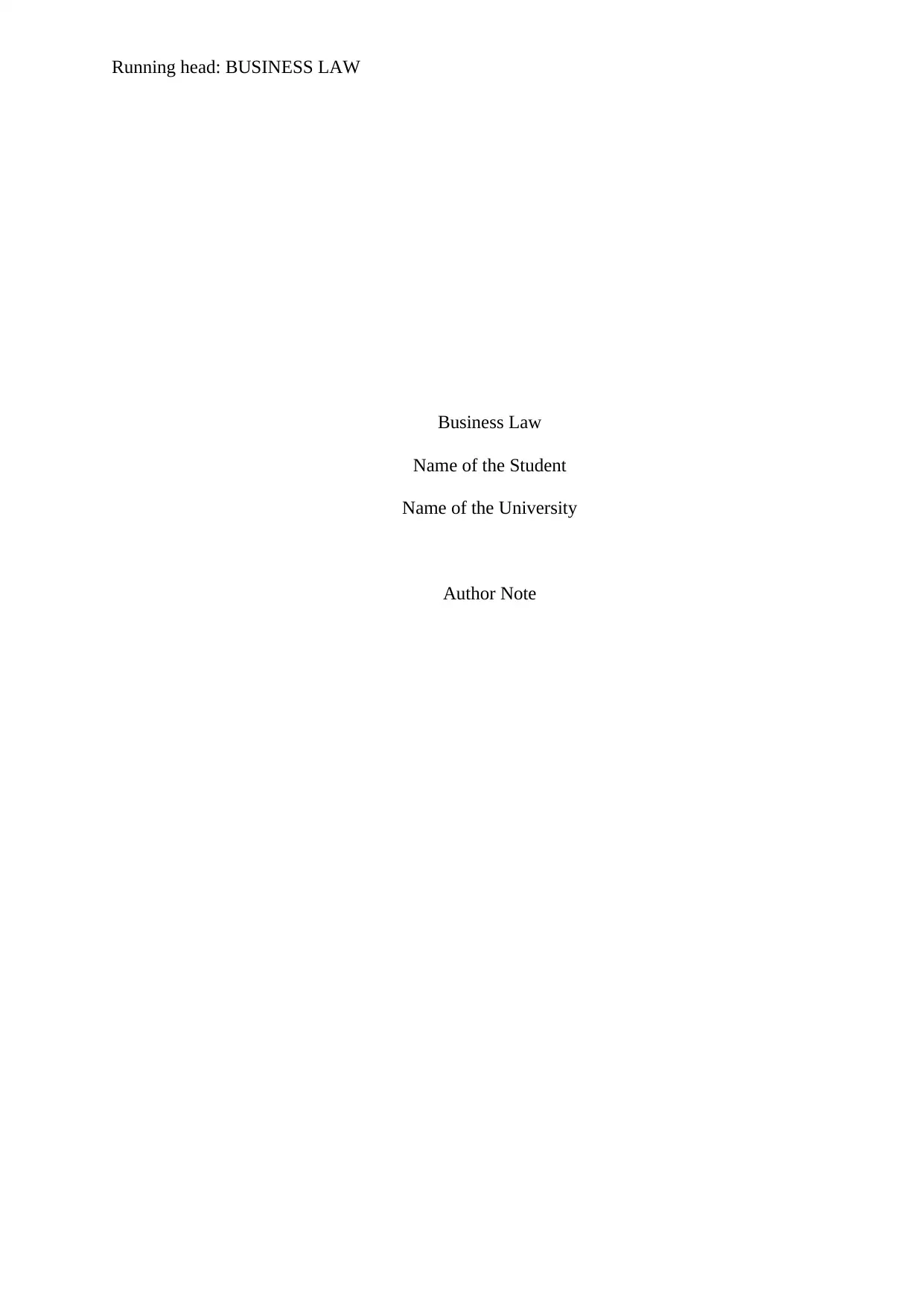
Running head: BUSINESS LAW
Business Law
Name of the Student
Name of the University
Author Note
Business Law
Name of the Student
Name of the University
Author Note
Paraphrase This Document
Need a fresh take? Get an instant paraphrase of this document with our AI Paraphraser
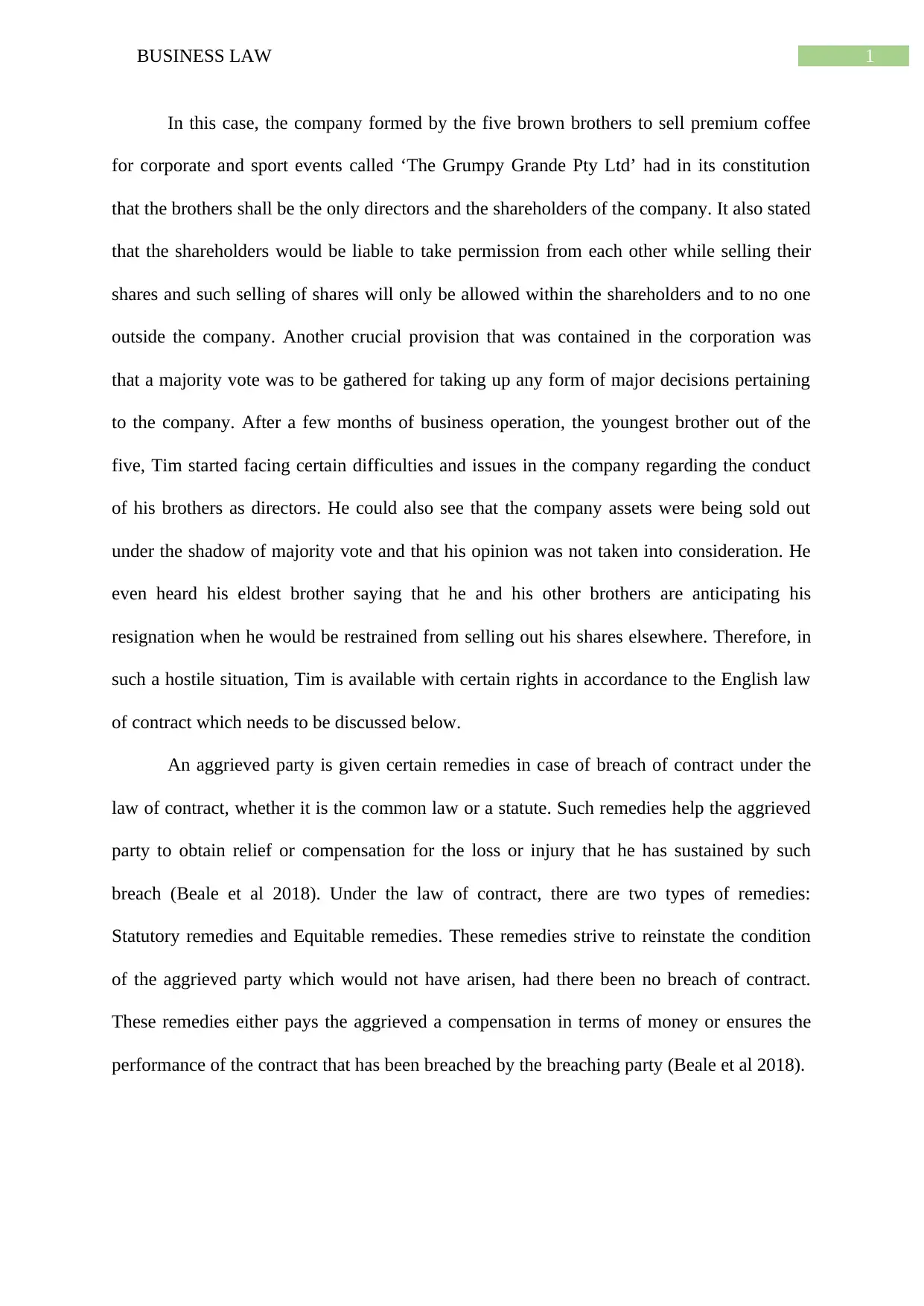
1BUSINESS LAW
In this case, the company formed by the five brown brothers to sell premium coffee
for corporate and sport events called ‘The Grumpy Grande Pty Ltd’ had in its constitution
that the brothers shall be the only directors and the shareholders of the company. It also stated
that the shareholders would be liable to take permission from each other while selling their
shares and such selling of shares will only be allowed within the shareholders and to no one
outside the company. Another crucial provision that was contained in the corporation was
that a majority vote was to be gathered for taking up any form of major decisions pertaining
to the company. After a few months of business operation, the youngest brother out of the
five, Tim started facing certain difficulties and issues in the company regarding the conduct
of his brothers as directors. He could also see that the company assets were being sold out
under the shadow of majority vote and that his opinion was not taken into consideration. He
even heard his eldest brother saying that he and his other brothers are anticipating his
resignation when he would be restrained from selling out his shares elsewhere. Therefore, in
such a hostile situation, Tim is available with certain rights in accordance to the English law
of contract which needs to be discussed below.
An aggrieved party is given certain remedies in case of breach of contract under the
law of contract, whether it is the common law or a statute. Such remedies help the aggrieved
party to obtain relief or compensation for the loss or injury that he has sustained by such
breach (Beale et al 2018). Under the law of contract, there are two types of remedies:
Statutory remedies and Equitable remedies. These remedies strive to reinstate the condition
of the aggrieved party which would not have arisen, had there been no breach of contract.
These remedies either pays the aggrieved a compensation in terms of money or ensures the
performance of the contract that has been breached by the breaching party (Beale et al 2018).
In this case, the company formed by the five brown brothers to sell premium coffee
for corporate and sport events called ‘The Grumpy Grande Pty Ltd’ had in its constitution
that the brothers shall be the only directors and the shareholders of the company. It also stated
that the shareholders would be liable to take permission from each other while selling their
shares and such selling of shares will only be allowed within the shareholders and to no one
outside the company. Another crucial provision that was contained in the corporation was
that a majority vote was to be gathered for taking up any form of major decisions pertaining
to the company. After a few months of business operation, the youngest brother out of the
five, Tim started facing certain difficulties and issues in the company regarding the conduct
of his brothers as directors. He could also see that the company assets were being sold out
under the shadow of majority vote and that his opinion was not taken into consideration. He
even heard his eldest brother saying that he and his other brothers are anticipating his
resignation when he would be restrained from selling out his shares elsewhere. Therefore, in
such a hostile situation, Tim is available with certain rights in accordance to the English law
of contract which needs to be discussed below.
An aggrieved party is given certain remedies in case of breach of contract under the
law of contract, whether it is the common law or a statute. Such remedies help the aggrieved
party to obtain relief or compensation for the loss or injury that he has sustained by such
breach (Beale et al 2018). Under the law of contract, there are two types of remedies:
Statutory remedies and Equitable remedies. These remedies strive to reinstate the condition
of the aggrieved party which would not have arisen, had there been no breach of contract.
These remedies either pays the aggrieved a compensation in terms of money or ensures the
performance of the contract that has been breached by the breaching party (Beale et al 2018).
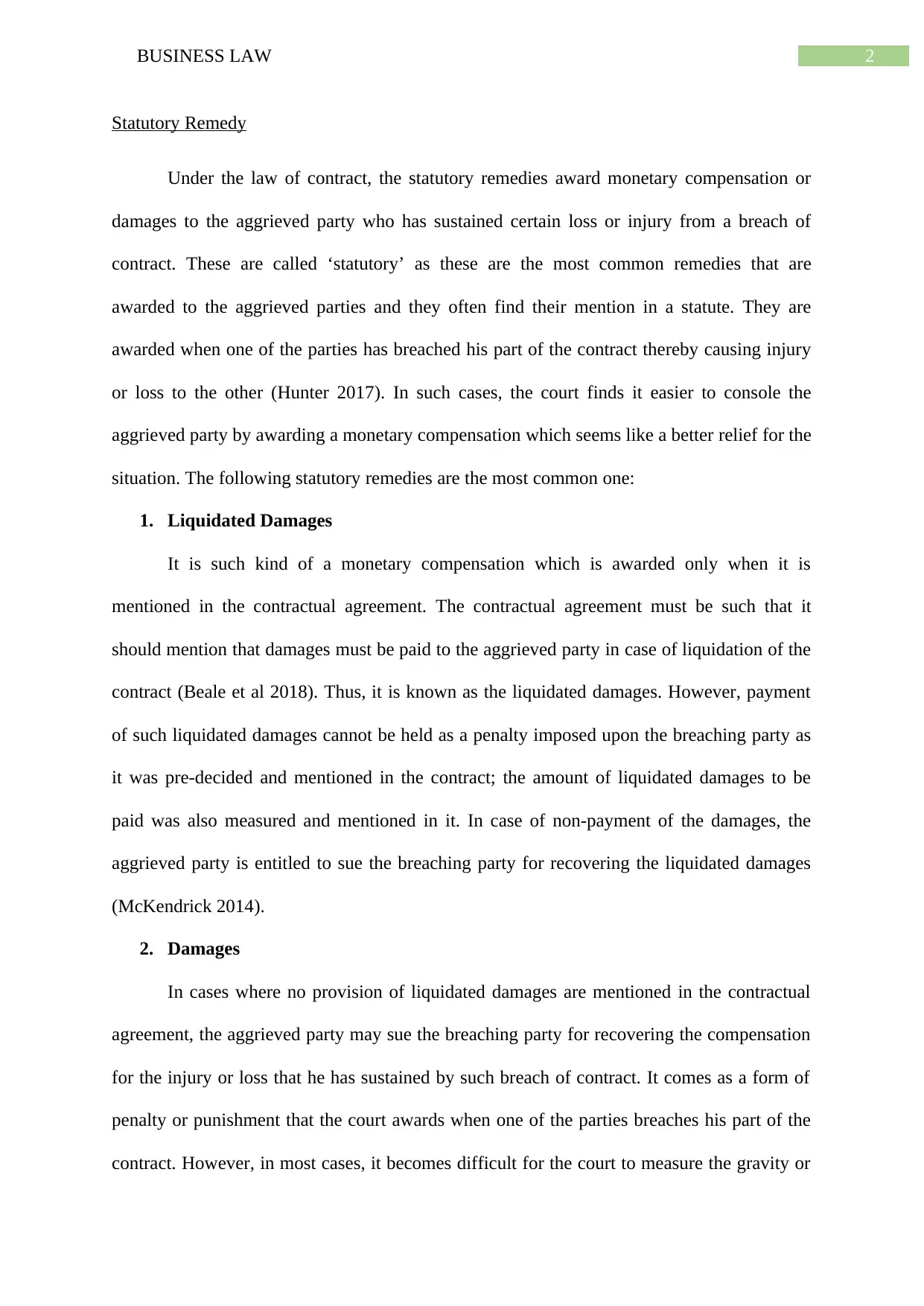
2BUSINESS LAW
Statutory Remedy
Under the law of contract, the statutory remedies award monetary compensation or
damages to the aggrieved party who has sustained certain loss or injury from a breach of
contract. These are called ‘statutory’ as these are the most common remedies that are
awarded to the aggrieved parties and they often find their mention in a statute. They are
awarded when one of the parties has breached his part of the contract thereby causing injury
or loss to the other (Hunter 2017). In such cases, the court finds it easier to console the
aggrieved party by awarding a monetary compensation which seems like a better relief for the
situation. The following statutory remedies are the most common one:
1. Liquidated Damages
It is such kind of a monetary compensation which is awarded only when it is
mentioned in the contractual agreement. The contractual agreement must be such that it
should mention that damages must be paid to the aggrieved party in case of liquidation of the
contract (Beale et al 2018). Thus, it is known as the liquidated damages. However, payment
of such liquidated damages cannot be held as a penalty imposed upon the breaching party as
it was pre-decided and mentioned in the contract; the amount of liquidated damages to be
paid was also measured and mentioned in it. In case of non-payment of the damages, the
aggrieved party is entitled to sue the breaching party for recovering the liquidated damages
(McKendrick 2014).
2. Damages
In cases where no provision of liquidated damages are mentioned in the contractual
agreement, the aggrieved party may sue the breaching party for recovering the compensation
for the injury or loss that he has sustained by such breach of contract. It comes as a form of
penalty or punishment that the court awards when one of the parties breaches his part of the
contract. However, in most cases, it becomes difficult for the court to measure the gravity or
Statutory Remedy
Under the law of contract, the statutory remedies award monetary compensation or
damages to the aggrieved party who has sustained certain loss or injury from a breach of
contract. These are called ‘statutory’ as these are the most common remedies that are
awarded to the aggrieved parties and they often find their mention in a statute. They are
awarded when one of the parties has breached his part of the contract thereby causing injury
or loss to the other (Hunter 2017). In such cases, the court finds it easier to console the
aggrieved party by awarding a monetary compensation which seems like a better relief for the
situation. The following statutory remedies are the most common one:
1. Liquidated Damages
It is such kind of a monetary compensation which is awarded only when it is
mentioned in the contractual agreement. The contractual agreement must be such that it
should mention that damages must be paid to the aggrieved party in case of liquidation of the
contract (Beale et al 2018). Thus, it is known as the liquidated damages. However, payment
of such liquidated damages cannot be held as a penalty imposed upon the breaching party as
it was pre-decided and mentioned in the contract; the amount of liquidated damages to be
paid was also measured and mentioned in it. In case of non-payment of the damages, the
aggrieved party is entitled to sue the breaching party for recovering the liquidated damages
(McKendrick 2014).
2. Damages
In cases where no provision of liquidated damages are mentioned in the contractual
agreement, the aggrieved party may sue the breaching party for recovering the compensation
for the injury or loss that he has sustained by such breach of contract. It comes as a form of
penalty or punishment that the court awards when one of the parties breaches his part of the
contract. However, in most cases, it becomes difficult for the court to measure the gravity or
⊘ This is a preview!⊘
Do you want full access?
Subscribe today to unlock all pages.

Trusted by 1+ million students worldwide
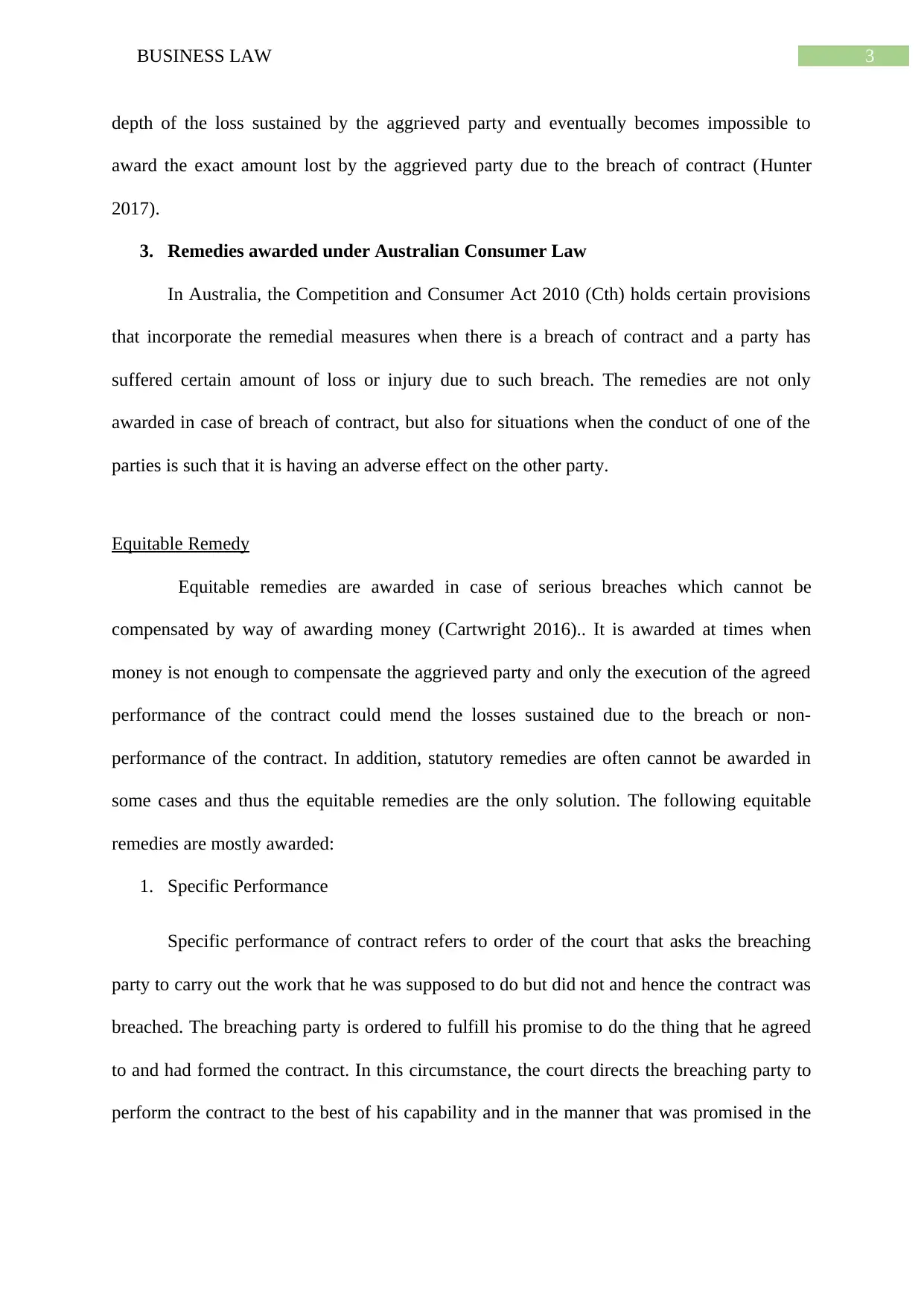
3BUSINESS LAW
depth of the loss sustained by the aggrieved party and eventually becomes impossible to
award the exact amount lost by the aggrieved party due to the breach of contract (Hunter
2017).
3. Remedies awarded under Australian Consumer Law
In Australia, the Competition and Consumer Act 2010 (Cth) holds certain provisions
that incorporate the remedial measures when there is a breach of contract and a party has
suffered certain amount of loss or injury due to such breach. The remedies are not only
awarded in case of breach of contract, but also for situations when the conduct of one of the
parties is such that it is having an adverse effect on the other party.
Equitable Remedy
Equitable remedies are awarded in case of serious breaches which cannot be
compensated by way of awarding money (Cartwright 2016).. It is awarded at times when
money is not enough to compensate the aggrieved party and only the execution of the agreed
performance of the contract could mend the losses sustained due to the breach or non-
performance of the contract. In addition, statutory remedies are often cannot be awarded in
some cases and thus the equitable remedies are the only solution. The following equitable
remedies are mostly awarded:
1. Specific Performance
Specific performance of contract refers to order of the court that asks the breaching
party to carry out the work that he was supposed to do but did not and hence the contract was
breached. The breaching party is ordered to fulfill his promise to do the thing that he agreed
to and had formed the contract. In this circumstance, the court directs the breaching party to
perform the contract to the best of his capability and in the manner that was promised in the
depth of the loss sustained by the aggrieved party and eventually becomes impossible to
award the exact amount lost by the aggrieved party due to the breach of contract (Hunter
2017).
3. Remedies awarded under Australian Consumer Law
In Australia, the Competition and Consumer Act 2010 (Cth) holds certain provisions
that incorporate the remedial measures when there is a breach of contract and a party has
suffered certain amount of loss or injury due to such breach. The remedies are not only
awarded in case of breach of contract, but also for situations when the conduct of one of the
parties is such that it is having an adverse effect on the other party.
Equitable Remedy
Equitable remedies are awarded in case of serious breaches which cannot be
compensated by way of awarding money (Cartwright 2016).. It is awarded at times when
money is not enough to compensate the aggrieved party and only the execution of the agreed
performance of the contract could mend the losses sustained due to the breach or non-
performance of the contract. In addition, statutory remedies are often cannot be awarded in
some cases and thus the equitable remedies are the only solution. The following equitable
remedies are mostly awarded:
1. Specific Performance
Specific performance of contract refers to order of the court that asks the breaching
party to carry out the work that he was supposed to do but did not and hence the contract was
breached. The breaching party is ordered to fulfill his promise to do the thing that he agreed
to and had formed the contract. In this circumstance, the court directs the breaching party to
perform the contract to the best of his capability and in the manner that was promised in the
Paraphrase This Document
Need a fresh take? Get an instant paraphrase of this document with our AI Paraphraser
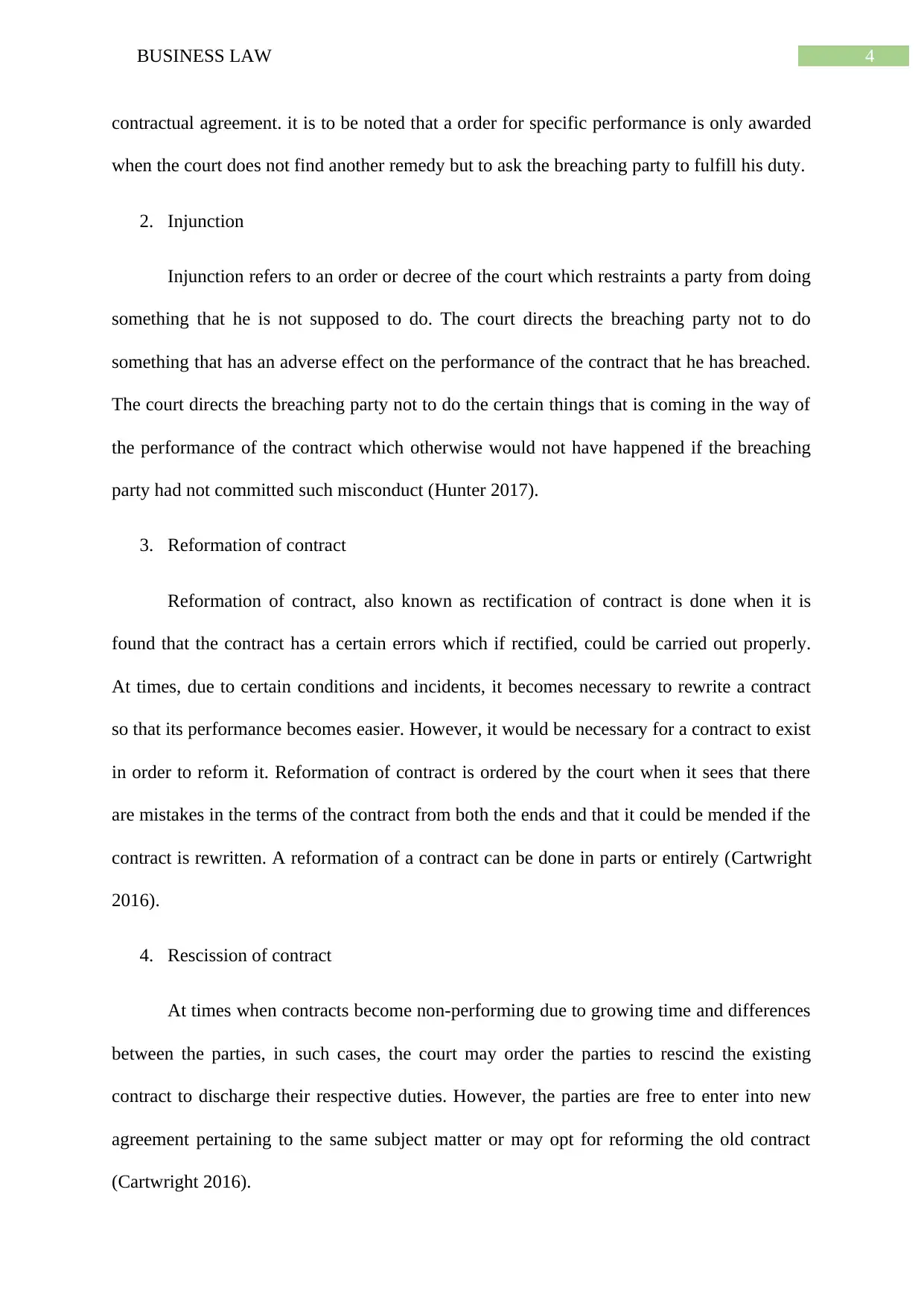
4BUSINESS LAW
contractual agreement. it is to be noted that a order for specific performance is only awarded
when the court does not find another remedy but to ask the breaching party to fulfill his duty.
2. Injunction
Injunction refers to an order or decree of the court which restraints a party from doing
something that he is not supposed to do. The court directs the breaching party not to do
something that has an adverse effect on the performance of the contract that he has breached.
The court directs the breaching party not to do the certain things that is coming in the way of
the performance of the contract which otherwise would not have happened if the breaching
party had not committed such misconduct (Hunter 2017).
3. Reformation of contract
Reformation of contract, also known as rectification of contract is done when it is
found that the contract has a certain errors which if rectified, could be carried out properly.
At times, due to certain conditions and incidents, it becomes necessary to rewrite a contract
so that its performance becomes easier. However, it would be necessary for a contract to exist
in order to reform it. Reformation of contract is ordered by the court when it sees that there
are mistakes in the terms of the contract from both the ends and that it could be mended if the
contract is rewritten. A reformation of a contract can be done in parts or entirely (Cartwright
2016).
4. Rescission of contract
At times when contracts become non-performing due to growing time and differences
between the parties, in such cases, the court may order the parties to rescind the existing
contract to discharge their respective duties. However, the parties are free to enter into new
agreement pertaining to the same subject matter or may opt for reforming the old contract
(Cartwright 2016).
contractual agreement. it is to be noted that a order for specific performance is only awarded
when the court does not find another remedy but to ask the breaching party to fulfill his duty.
2. Injunction
Injunction refers to an order or decree of the court which restraints a party from doing
something that he is not supposed to do. The court directs the breaching party not to do
something that has an adverse effect on the performance of the contract that he has breached.
The court directs the breaching party not to do the certain things that is coming in the way of
the performance of the contract which otherwise would not have happened if the breaching
party had not committed such misconduct (Hunter 2017).
3. Reformation of contract
Reformation of contract, also known as rectification of contract is done when it is
found that the contract has a certain errors which if rectified, could be carried out properly.
At times, due to certain conditions and incidents, it becomes necessary to rewrite a contract
so that its performance becomes easier. However, it would be necessary for a contract to exist
in order to reform it. Reformation of contract is ordered by the court when it sees that there
are mistakes in the terms of the contract from both the ends and that it could be mended if the
contract is rewritten. A reformation of a contract can be done in parts or entirely (Cartwright
2016).
4. Rescission of contract
At times when contracts become non-performing due to growing time and differences
between the parties, in such cases, the court may order the parties to rescind the existing
contract to discharge their respective duties. However, the parties are free to enter into new
agreement pertaining to the same subject matter or may opt for reforming the old contract
(Cartwright 2016).
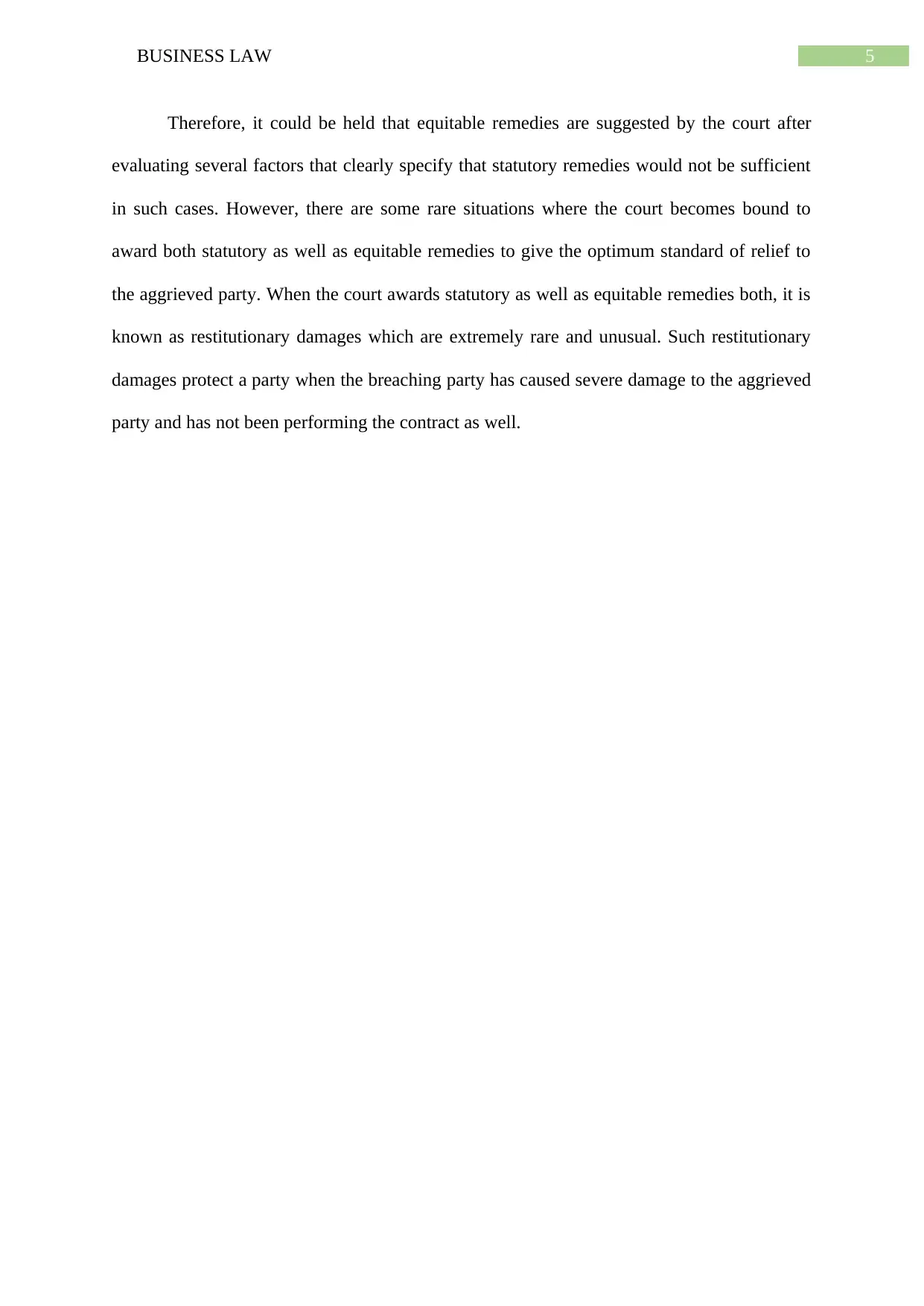
5BUSINESS LAW
Therefore, it could be held that equitable remedies are suggested by the court after
evaluating several factors that clearly specify that statutory remedies would not be sufficient
in such cases. However, there are some rare situations where the court becomes bound to
award both statutory as well as equitable remedies to give the optimum standard of relief to
the aggrieved party. When the court awards statutory as well as equitable remedies both, it is
known as restitutionary damages which are extremely rare and unusual. Such restitutionary
damages protect a party when the breaching party has caused severe damage to the aggrieved
party and has not been performing the contract as well.
Therefore, it could be held that equitable remedies are suggested by the court after
evaluating several factors that clearly specify that statutory remedies would not be sufficient
in such cases. However, there are some rare situations where the court becomes bound to
award both statutory as well as equitable remedies to give the optimum standard of relief to
the aggrieved party. When the court awards statutory as well as equitable remedies both, it is
known as restitutionary damages which are extremely rare and unusual. Such restitutionary
damages protect a party when the breaching party has caused severe damage to the aggrieved
party and has not been performing the contract as well.
⊘ This is a preview!⊘
Do you want full access?
Subscribe today to unlock all pages.

Trusted by 1+ million students worldwide
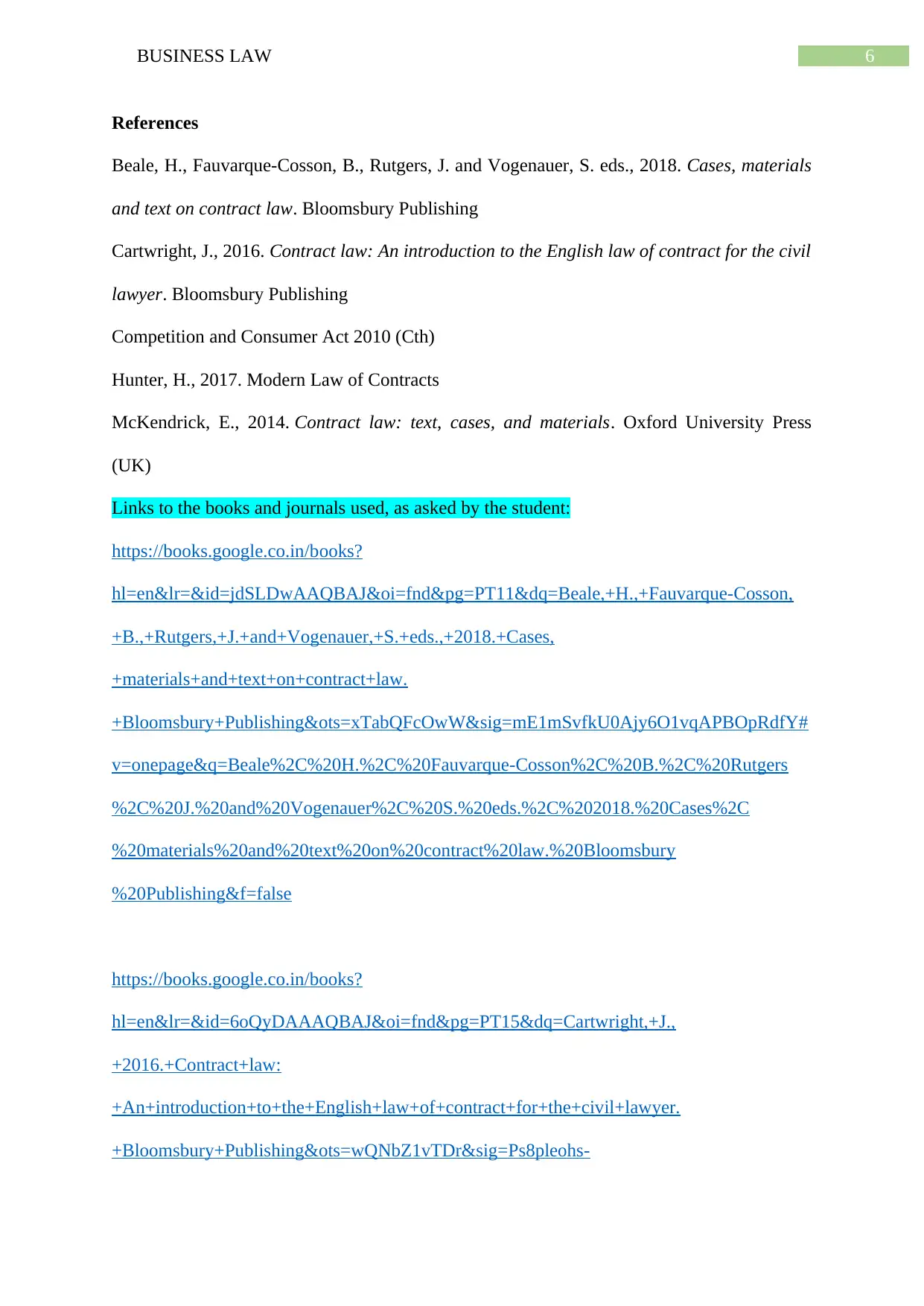
6BUSINESS LAW
References
Beale, H., Fauvarque-Cosson, B., Rutgers, J. and Vogenauer, S. eds., 2018. Cases, materials
and text on contract law. Bloomsbury Publishing
Cartwright, J., 2016. Contract law: An introduction to the English law of contract for the civil
lawyer. Bloomsbury Publishing
Competition and Consumer Act 2010 (Cth)
Hunter, H., 2017. Modern Law of Contracts
McKendrick, E., 2014. Contract law: text, cases, and materials. Oxford University Press
(UK)
Links to the books and journals used, as asked by the student:
https://books.google.co.in/books?
hl=en&lr=&id=jdSLDwAAQBAJ&oi=fnd&pg=PT11&dq=Beale,+H.,+Fauvarque-Cosson,
+B.,+Rutgers,+J.+and+Vogenauer,+S.+eds.,+2018.+Cases,
+materials+and+text+on+contract+law.
+Bloomsbury+Publishing&ots=xTabQFcOwW&sig=mE1mSvfkU0Ajy6O1vqAPBOpRdfY#
v=onepage&q=Beale%2C%20H.%2C%20Fauvarque-Cosson%2C%20B.%2C%20Rutgers
%2C%20J.%20and%20Vogenauer%2C%20S.%20eds.%2C%202018.%20Cases%2C
%20materials%20and%20text%20on%20contract%20law.%20Bloomsbury
%20Publishing&f=false
https://books.google.co.in/books?
hl=en&lr=&id=6oQyDAAAQBAJ&oi=fnd&pg=PT15&dq=Cartwright,+J.,
+2016.+Contract+law:
+An+introduction+to+the+English+law+of+contract+for+the+civil+lawyer.
+Bloomsbury+Publishing&ots=wQNbZ1vTDr&sig=Ps8pleohs-
References
Beale, H., Fauvarque-Cosson, B., Rutgers, J. and Vogenauer, S. eds., 2018. Cases, materials
and text on contract law. Bloomsbury Publishing
Cartwright, J., 2016. Contract law: An introduction to the English law of contract for the civil
lawyer. Bloomsbury Publishing
Competition and Consumer Act 2010 (Cth)
Hunter, H., 2017. Modern Law of Contracts
McKendrick, E., 2014. Contract law: text, cases, and materials. Oxford University Press
(UK)
Links to the books and journals used, as asked by the student:
https://books.google.co.in/books?
hl=en&lr=&id=jdSLDwAAQBAJ&oi=fnd&pg=PT11&dq=Beale,+H.,+Fauvarque-Cosson,
+B.,+Rutgers,+J.+and+Vogenauer,+S.+eds.,+2018.+Cases,
+materials+and+text+on+contract+law.
+Bloomsbury+Publishing&ots=xTabQFcOwW&sig=mE1mSvfkU0Ajy6O1vqAPBOpRdfY#
v=onepage&q=Beale%2C%20H.%2C%20Fauvarque-Cosson%2C%20B.%2C%20Rutgers
%2C%20J.%20and%20Vogenauer%2C%20S.%20eds.%2C%202018.%20Cases%2C
%20materials%20and%20text%20on%20contract%20law.%20Bloomsbury
%20Publishing&f=false
https://books.google.co.in/books?
hl=en&lr=&id=6oQyDAAAQBAJ&oi=fnd&pg=PT15&dq=Cartwright,+J.,
+2016.+Contract+law:
+An+introduction+to+the+English+law+of+contract+for+the+civil+lawyer.
+Bloomsbury+Publishing&ots=wQNbZ1vTDr&sig=Ps8pleohs-
Paraphrase This Document
Need a fresh take? Get an instant paraphrase of this document with our AI Paraphraser

7BUSINESS LAW
rACYEzkenS_E9T3lg#v=onepage&q=Cartwright%2C%20J.%2C%202016.%20Contract
%20law%3A%20An%20introduction%20to%20the%20English%20law%20of%20contract
%20for%20the%20civil%20lawyer.%20Bloomsbury%20Publishing&f=false
https://ink.library.smu.edu.sg/sol_research/40/
https://books.google.co.in/books?
hl=en&lr=&id=dIZSAwAAQBAJ&oi=fnd&pg=PP1&dq=McKendrick,+E.,
+2014.+Contract+law:+text,+cases,+and+materials.+Oxford+University+Press+(UK)&ots=-
acv6JxA9U&sig=mV3RsjkbodcALPGCvti_-A4_R80#v=onepage&q=McKendrick%2C
%20E.%2C%202014.%20Contract%20law%3A%20text%2C%20cases%2C%20and
%20materials.%20Oxford%20University%20Press%20(UK)&f=false
rACYEzkenS_E9T3lg#v=onepage&q=Cartwright%2C%20J.%2C%202016.%20Contract
%20law%3A%20An%20introduction%20to%20the%20English%20law%20of%20contract
%20for%20the%20civil%20lawyer.%20Bloomsbury%20Publishing&f=false
https://ink.library.smu.edu.sg/sol_research/40/
https://books.google.co.in/books?
hl=en&lr=&id=dIZSAwAAQBAJ&oi=fnd&pg=PP1&dq=McKendrick,+E.,
+2014.+Contract+law:+text,+cases,+and+materials.+Oxford+University+Press+(UK)&ots=-
acv6JxA9U&sig=mV3RsjkbodcALPGCvti_-A4_R80#v=onepage&q=McKendrick%2C
%20E.%2C%202014.%20Contract%20law%3A%20text%2C%20cases%2C%20and
%20materials.%20Oxford%20University%20Press%20(UK)&f=false
1 out of 8
Related Documents
Your All-in-One AI-Powered Toolkit for Academic Success.
+13062052269
info@desklib.com
Available 24*7 on WhatsApp / Email
![[object Object]](/_next/static/media/star-bottom.7253800d.svg)
Unlock your academic potential
Copyright © 2020–2026 A2Z Services. All Rights Reserved. Developed and managed by ZUCOL.





